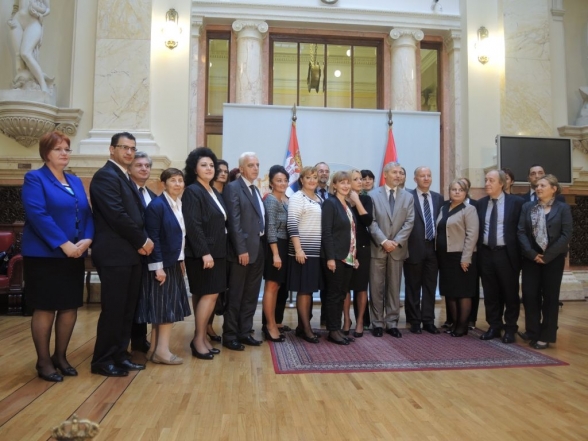Delegation of the Committee on Human Rights and Freedoms in the following composition: the Committee Chairperson Mr Halil Duković, MD; the Deputy Chairperson Ljiljana Đurašković, PhD; and the Committee Secretary Ms Slava Burić participated in the First Regional Meeting of Parliamentary Bodies Competent for Human and Minority Rights and Gender Equality, held on 29 and 30 October in Belgrade, in the National Assembly of the Republic of Serbia.
The participants of the First Regional Meeting, the representatives of the parliamentary bodies competent for human and minority rights and gender equality from five countries of the Western Balkans: Serbia, Montenegro, Bosnia and Herzegovina, Croatia and Macedonia, gathered to consider the role of the parliamentary bodies in protection of human rights, rights of national minorities and gender equality. The intention of the meeting was to establish goals and directions of further inter-parliamentary cooperation. The participants considered the role of the parliamentary working bodies in protection of human rights, the rights of national minorities and promotion of gender equality, through the following:
• Ratification of the international standards and ensuring their implementation at the national level,
• Support and cooperation with the relevant national institutions in the field of human rights, rights of national minorities and gender equality,
• Active participation, cooperation and interaction between the parliamentary bodies and the representatives of the civil sector.
The meeting was organised with the assistance of the OCSE Mission in Serbia, and at the First Regional Meeting of Parliamentary Bodies Competent for Human and Minority Rights and Gender Equality, apart from the chairpersons, members and secretaries of parliamentary working bodies of the said regional countries, the participants of the meeting were greeted, on behalf of the host of the meeting, Mr Meho Omerović, the Chairperson of the Committee on Human and Minority Rights of the National Assembly of the Republic of Serbia; Ms Barbara Lochbihler, Chairperson of the Subcommittee on Human Rights of the European Parliament; Mr Laszlo Tokes, member of the Subcommittee on Human Rights of the European Parliament; Ms Paula Thiede, Deputy Head of the OSCE Mission to Serbia; as well as Ms Gordana Čomić, the Rapporteur of the General Committee on Democracy, Human Rights and Humanitarian Questions of the OSCE Parliamentary Assembly.
On the first working day, while presenting the work and competencies of the parliamentary bodies in the field of human rights and gender equality, as well as individual experiences and practical action, the participants were addressed by the following: Ms Milica Marković, Second Deputy of the Commission for Achieving Gender Equality of the Parliamentary Assembly of Bosnia and Herzegovina; Ms Nansi Tireli, the Chairperson of the Gender Equality Committee of the Croatian Parliament; Ms Liljana Popovska, the Chairperson of the Commission for Equal Opportunity for Women and Men of the Assembly of the Republic of Macedonia; Ms Nermina Kapetanović, First Deputy Chairperson of the Joint Committee on Human Rights, Rights of Children, Youth, Immigration, Refugees, Asylum and Ethics of the Parliamentary Assembly of Bosnia and Herzegovina; Mr Furio Radin, the Chairperson of the Committee on Human Rights and Rights of National Minorities of the Croatian Parliament; Mr Meho Omerović, Chairperson of the Committee on Human and Minority Rights and Gender Equality of the National Republic of Serbia; and, from the Parliament of Montenegro, a member of the Gender Equality Committee, Ms Žana Filipović, and the Chairperson of the Committee on Human Rights and Freedoms, Mr Halil Duković, PhD.
The second working day was divided into two working groups covering two topics:
- Role of Parliamentary Working Bodies in Promotion and Protection of Human Rights and National Minority Rights,
- Role of Parliamentary Working Bodies in Promotion of Gender Equality and Enhancing the Political Participation of Women – Good Practice Examples and Greatest Challenges.
All speeches had in common the estimate about the importance of protection of human and minority rights following the events in the Balkans, with gratitude to OSCE, which recognised the importance of this issue and the need to exchange experiences and promote protection of these rights in accordance with the international standards through regional cooperation.
All participants of the meeting agreed that prejudice cannot be eradicated from human minds, but conduct driven by prejudice can be prohibited by adopting laws that would sanction the misdemeanour or criminal responsibility regarding violation of human rights.
Additionally, it was concluded that all the countries in the region had the same problem – good normative regulations in this field, but bad implementation of laws in practice, so that in real life citizens mostly had protection of their rights written down somewhere on paper. Therefore, a need to make a list of reasons that disabled their implementation in practice was pointed out, through exchange of experiences, good or bad practice. They especially pointed out the need for changing stereotypes and prejudice in this region and using “the good winds blowing in this field in the territory of the Western Balkans countries”. In that regard, the need for strengthening regional cooperation and organising cycles of holding of these types of conferences was highlighted, where each of the countries in the region would host a conference, on the certain topics that would be previously defined, all with a view of strengthening mechanisms and procedures ensuring effectiveness of work and fulfilling competencies of the parliamentary bodies.
The priority fields of further action were defined in the following period:
- national minority rights,
- resolving the issue of refugees and displaced persons,
- economic rights, primarily the right to work,
- protection of persons with different sexual orientation,
- rights of Roma and in that regard support to the regional project of Roma inter-parliamentary organisation,
- rights of women and gender equality, and
- protection of child rights, and especially protection from child pornography and cyber-crime.
Upon completion of the First Regional Meeting of Parliamentary Bodies Competent for Human and Minority Rights and Gender Equality, the delegations adopted a Joint Statement and Conclusions from the meeting.









